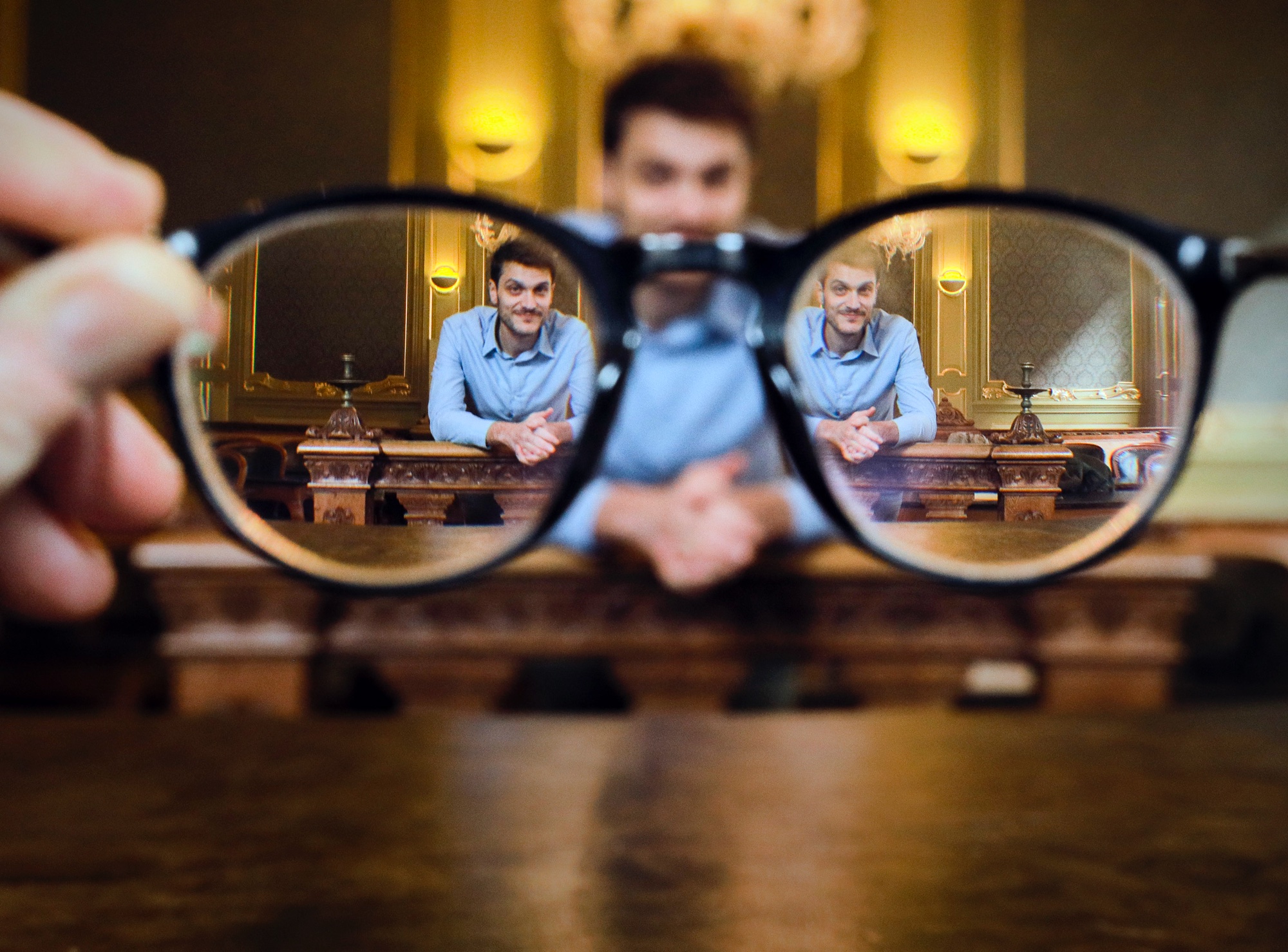Humour in the courtroom, and how the humanities can help
They keep piling up – legal cases involving comedians, cartoonists or social media users who are taken to court for an inappropriate joke, meme or cartoon. Dr Alberto Godioli , Associate Professor of European Culture and Literature at the University of Groningen, is working on a toolkit for (and with) judges to help them adopt a balanced, systematic approach.
Text: Lieke van den Krommenacker | Photos: Henk Veenstra

Suppose that you have a nephew who was born on 11 September 2009. For his third birthday, you gift him a T-shirt with the words Je suis une bombe (which translates as: I’m the bomb) on the front, and his name and birthday on the back – which would be Jihad (a common Arabic name that means ‘effort,’ not specifically ‘holy war’), born on September 11th. And suppose that you ask your sister – your nephew’s mother – to send her boy to nursery school wearing this T-shirt, and she agrees. Does this mean that you are guilty of glorifying terrorism? Or did you ‘just’ make an inappropriate joke that is protected under the freedom of speech? And, if you were a judge, what considerations would go into your fair assessment of the matter?
Well, Alberto Godioli and his team of researchers might be able to answer these questions for you. Godioli leads Humour in Court, a project funded by the Dutch Research Council (NWO) focusing on humour and the law. Or, more specifically, humour and the law in the context of free speech jurisprudence. ‘We look at case law on such matters as defamation, incitement to hatred or copyright violation revolving around jokes, memes, cartoons, and other forms of humour,’ Godioli says. ‘Our focus is on interpretation: as a court, how do you deal with the fact that a joke is likely to be interpreted differently by different people?’
Toolkit
In collaboration with legal professionals from across the globe, Godioli and his colleagues are working on a toolkit with guidelines that are meant to help courts decide as fairly and systematically as possible. The goal is not to devise a one-size-fits-all formula for courts to objectively establish the exact meaning of a joke. ‘Rather, we want to give them the tools to adopt a more methodical approach to evaluating jokes, while recognizing their inherently subjective nature,’ Godioli says.
This means, Godioli argues, that a joke should be considered in a broader context. Does it rely on metaphor? Is there absurdity involved? Is the joke in keeping with a specific trend? What is the target audience? And can we reasonably assume that the intended audience will know that it is a joke?
Godioli: ‘A balanced assessment of a controversial joke calls for a closer look at a number of contextual elements. Yet, the degree to which these elements are considered in court varies widely from one court case to the next.’ And that is exactly why a discipline such as law has so much to gain from a closer dialogue with literary theory, cultural studies, and the humanities in general: ‘in these fields too, it’s all about context and interpretation.’

Conflicting rulings
Back to the nephew and his T-shirt. This real-life case, which reached the European Court of Human Rights as ‘ZB v. France’, started near Avignon, France, and caused quite the stir. It is a telling example of how complex the relationship between humour and the law actually is. In the long line of court cases that followed the day the nephew showed up at nursery school wearing his new T-shirt (the school director alerted the mayor and eventually the case ended up in court), different courts handed down different – and conflicting – rulings.
Godioli: ‘ZB won round one, because the court in Avignon ruled that the joke may have been highly inappropriate and misplaced, but it did not glorify terrorism.’ One of the reasons why the court reached this conclusion was that ZB did not have any ties to a terrorist organization. The Prosecutor’s office appealed the decision and won the case. The Court of Appeal ordered ZB to pay a fine of €4,000, in addition to two months of suspended imprisonment. Moreover, Jihad’s mother was ordered to pay a fine of €2,000 and received a one-month suspended prison sentence. This judgment was subsequently upheld by the European Court of Human Rights in Strasbourg.
Dark humour
‘Aside from who you think is right,’ Godioli says, ‘a number of aspects of this joke were left unconsidered.’ He refers to the fact that hard-hitting jokes about Muslims became more common after 9/11, including jokes by comedians from a Muslim background themselves, who started using Islamophobic clichés in an ironic way. Just after the 9/11 attacks, British stand-up comedian Shazia Mirza, for instance, opened her shows with the line: ‘My name is Shazia Mirza – or at least, that’s what it says on my pilot’s licence.’
Godioli: ‘This is a form of dark humour that makes fun of the idea that all Muslims should be considered terrorists unless proven otherwise. Perhaps ZB, who – like Mirza – is from a Muslim background, was also trying to make such a joke in his own distasteful way.’ The medium ZB chose for his joke was not examined in further detail either. ‘If your intention is to glorify terrorism and you are trying to convert people to Jihadism, would you really do that by gifting a T-shirt to your three-year-old nephew?’
That is not to say that the court should necessarily have reached an entirely different decision, Godioli emphasizes. ‘We just call for a nuanced and considered interpretation of these types of jokes. That’s important because a court ruling might set a precedent.’

Online threats
The researcher chooses his words carefully and for good reason. When a vacancy for a post-doc candidate for Godioli’s research was posted in 2021, journalist Roderick Veelo wrote a scathing column in De Telegraaf, a Dutch daily newspaper, claiming that Godioli aimed to restrict freedom of speech through his research. The publication resulted in online attacks and threats against Godioli on what was then still known as Twitter.
‘He was quite selective in his reading,’ Godioli says, looking back on the matter. ‘At the time, the research project was called Forensic Humour Analysis: Rethinking Offensive Humour and Its Legal Regulation. His main issue was with the word “regulation”, which in the legal context is just a synonym for “dealing with”. So, while the project’s emphasis lies in reconsidering how courts already deal with offensive humour, this columnist decided that it was all about censoring humour and cancelling comedians.’
The journalist should have known better, as the vacancy posting referred explicitly to Godioli’s collaboration with organizations and research centres that advocate freedom of speech. The project’s stakeholders include Global Freedom of Expression (Columbia University), UNESCO, and Cartooning for Peace among others. Through these partnerships, a large global network of legal experts, judges, lawyers, human rights organizations, artists, and cartoonists has been created over time. This network is hosted by ForHum: Forum for Humor and the Law, a website founded by Godioli and Laura Little, a US-based Law professor. One of the features offered on this platform is a ‘living database’, which is regularly updated with relevant court cases.
Ironically, Veelo’s column was the perfect illustration of Godioli’s point: context is everything. Thankfully, the whole thing fizzled out after a few days. In May 2023, Godioli and Little presented ‘their’ ForHum website at the UNESCO World Press Freedom Day. And a report on humour-related case law co-authored by Godioli was published last July by Global Freedom of Expression.
A final version of the toolkit with guidelines is expected to become available in early 2025. Everyone involved is keen for it to be published. Rightly so, Godioli explains: ‘There is definitely no shortage of court cases dealing with humour and satire. We can hardly keep up.’
More information
The ‘Humour in Court’ team consists of Alberto Godioli (Principal Investigator), Jennifer Young and Matteo Fiori (postdocs), Melissa Luypaers (PhD candidate) and Elene Amiranashvili (research assistant).
For more information, see the ForHum website
Read the Global Freedom of Expression paper on case law on humour and freedom of expression
| Last modified: | 02 May 2024 1.07 p.m. |
More news
-
08 October 2024
Tracking the tongue
Thomas Tienkamp and Teja Rebernik explain how fundamental research on articulation could help explain speech disorders and may contribute to the recovery of people with speech disorders in the future.
-
08 October 2024
Passion for sustainable fashion
Chilean journalist María Pilar Uribe Silva has dedicated half her life to making the clothing industry more sustainable. This summer, she started a PhD project at the RUG. ‘I think it is possible, a more just and sustainable clothing sector. What...
-
01 October 2024
Will there be a female American president?
Historian Jelte Olthof is interested in the origins, workings, and influence of the US Constitution. How does the 1787 Constitution function in present-day America? An America that is rapidly changing and where, in 2024, a female president may be...
